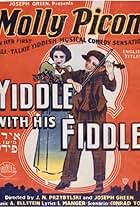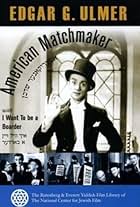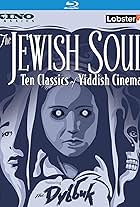Advanced search
- TITLES
- NAMES
- COLLABORATIONS
Search filters
Enter full date
to
or just enter yyyy, or yyyy-mm below
to
to
to
Exclude
Only includes titles with the selected topics
to
In minutes
to
1-50 of 92
- The 1941 invasion of Soviet Ukraine by Nazi Germany is shown through the life of inhabitants of a Yiddish village at the border of Poland.
- The mystical love story between Chonen, a poor Talmud student, and Lea, a girl from a wealthy family, depicts the traditional folk culture of Polish Jews before WW2.
- Within Brooklyn's ultra-orthodox Jewish community, a widower battles for custody of his son. A tender drama performed entirely in Yiddish, the film intimately explores the nature of faith and the price of parenthood.
- When you wage war on your community, you wage war on your family.
- A young woman posing as a man in a group of klezmer musicians in Poland.
- The original, non-musical film version of the book which inspired "Fiddler on the Roof".
- Two young people experience love and loss while in hiding during WWII. After a life of regret, the young man, now old, is faced with an opportunity for redemption.
- In a kosher meat packaging plant. Avrum one of the owners uncovers a operation involving his partner selling nonkosher meat under their company name. Can he stop it before it becomes a scandal and ruines the company?
- The action of the movie takes place in the thirties before the Jewish pogrom in the border town of Poland, which became a kind of emigration zone. Two teenagers - Ivan and Abram - run away from the dictates of adults into a big life.
- Nat Silver has been engaged 7 times already. This time, his 8th, he's really going to get married. But a visitor shows up, Shirley's old boyfriend. With a gun ! He'll kill himself unless he can have Shirley back, and Nat graciously gives in. According to Nat's mother, his Uncle Shya was unlucky at love but lucky as a matchmaker, and Nat is just like Shya. Nat tells his family he's going to Italy. But he remains in New York and sets himself up with a new name and new business, Nat Gold, Advisor in Human Relations...
- A young woman tries to repay her adoptive parents' kindness by shielding their biological child, who has gotten involved with an embezzler, from the police.
- Ulmer's soulful, open-air adaptation of Peretz Hirshbein's classic play heralded the Golden Age of Yiddish cinema. When an ascetic young scholar ventures into the countryside, searching for the city of "true Jews," he learns some unexpected lessons from the Jewish peasants who take him in as a tutor for their children.
- Wealthy, powerful sweatshop owner falls in love with employee's teenage daughter, who feels obligated to marry him after he shares his wealth with her parents, though she actually loves a young Marxist unionizer.
- Seven young people tell their personal stories with the Yiddish language while discussing the life and work of avant-garde Yiddish poets.
- Saül Birnbaum is a "hidden child", who, at the age of six, was separated from his parents to escape the Holocaust. He was sent away by the so-called "Kindertransport". In 1986, Saül is on the path to recovery: he has opened a delicatessen unlike any other, where movies are shown every day. Saül and his protégé, Joakin, a young Chilean director who fled from Pinochet's dictatorship, decide to write the story of Saül's childhood and turn it into a film, allowing both of them to "heal" just a little more. However, love comes knocking on Saül's door, forcing him to confront his past.
- One of the last Yiddish films made in Poland before the Nazi invasion, this film tells the story of a mother's persistent struggles to support her three children in pre-war World War II Polish Ukraine. After her family is pulled apart by severe poverty and the turmoil of war, she and her children make their way to New York and turn to the Hebrew Immigrant Aid Society for help.
- Based on a play by Jacob Gordin, God, Man and Devil centers on a wager between God and Satan that has dire consequences. Beware, the film cautions, when money sounds sweeter than music.
- Written by Israel Becker, this is the first feature film to represent the Holocaust from a Jewish perspective. Shot on location at Landsberg, the largest DP camp in U.S.-occupied Germany, and mixing neorealist and expressionist styles, the film follows a Polish Jew and his family from pre-war Warsaw through Auschwitz and the DP camps.
- Mothers of Today includes the sole motion picture performance of radio star Esther Field, who was well known on the airwaves of the 1930s as the 'Yiddishe Mama.' The film exemplifies the Yiddish film genre of shund, a brand of popular entertainment which appealed to working-class Jewish-American immigrant audiences with broadly-drawn, sentimental stories that reflected the daily life and culture of a distinctively American Yiddish community. While the shund films were invariably low-budget (and low-brow) affairs, these humble productions formed an important part of life in the United States for their audience. For actresses such as Field or Celia Adler (star of Where is My Child?, also directed by Lynn in 1939), shund offered one of the few opportunities to play strong leading roles. In retrospect, Mothers of Today is an important cultural artifact expressing the anxieties of Jewish immigrant families faced with the younger generation's increasing assimilation into mainstream American society. Shund often dealt with the plight of the Jewish mother, recognizing the important role women played in Jewish family life during the difficult period of immigration. Such is the case with Mothers of Today, in which Field plays a mother coping with her children's troubles resulting from their straying from Jewish tradition. In one subplot, a cantor's son led astray by a woman of "questionable morality" becomes involved with gangsters and ends up stealing the deed to his mother's store. On March 14, 1939, Film Daily reviewed Mothers of Today as follows: "Heavy tragedy, which seems to be an essential basis of all Yiddish dramas, is done to a turn in this new film and it should please the dyed in the wool Yiddish fans. Produced on a small budget with a hurried shooting schedule, the film has considerable merit. Cast members, with the exception of the talented Esther Field, were recruited from the stage for their initial appearance on the screen, and they give Miss Field adequate support. Henry Lynn directs the film feelingly. The story deals with the tragedies which beset Miss Field as her children get in trouble."
- Historical documentary made up of footage and stills shot by the Nazis. A compilation of testimony from witnesses who appeared at the Eichmann trial provides a telling narrative.
- A jewish cantor is seduced by the allure of opera when introduced to it by two attractive young Poles.
- In a small town in Russia in the 1880s, two young but poor lovers are helped by a wise old bookseller.
- A German-Jewish artist encounters German anti-semitism when his masterpiece is rejected by the Berlin Academy of Art. Later, the figure in the painting comes to life and tells him the history of the Jews' persecution. This unusual film ends with footage of an anti-Hitler rally at New York City's Madison Square Garden.






















